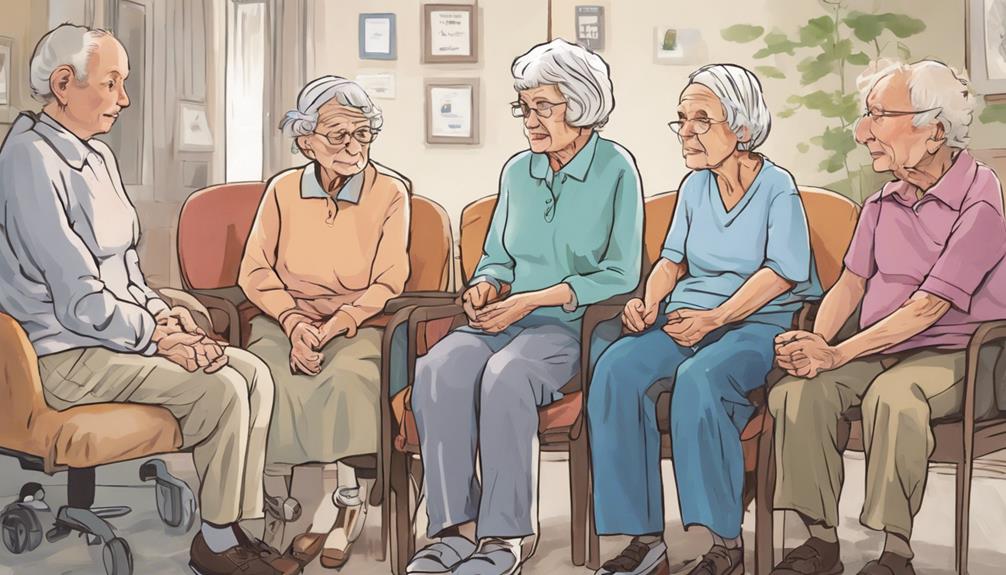When navigating the intricate realm of dementia caregiving, hospice serves as a beacon of clarity amidst uncertainty. Consider it a guiding light on the journey to providing comfort and support for those with dementia and their families.
But how exactly does hospice achieve this delicate balance of care and compassion in the face of such a challenging condition? Let's explore the nuanced ways in which hospice steps in to provide specialized assistance and holistic care for those journeying through dementia's intricate landscape.
Key Takeaways
- Personalized care plans address unique needs of dementia patients.
- Comprehensive support includes physical, emotional, and spiritual care.
- Specialized symptom management prioritizes quality of life.
- Assistance with end-of-life decisions empowers patients and families.
Understanding Hospice Care for Dementia
If you or a loved one is facing dementia and considering hospice care, understanding the comprehensive support available is crucial for making informed decisions about end-of-life care.
Hospice care for dementia patients goes beyond just medical care. It involves creating personalized care plans that focus on pain management, nutrition, and overall well-being to enhance the quality of life during this challenging time.
In addition to medical assistance, emotional support is a cornerstone of hospice care for dementia. Volunteers, chaplains, and counselors are there to provide comfort and spiritual guidance, not only for the patient but also for their family members.
Support doesn't stop at the patient; hospice services extend a helping hand to family and friends, offering guidance and assistance throughout the journey. Moreover, caregivers of dementia patients under hospice care receive educational training and are provided with backup support and respite care to ensure they can continue providing the best care possible.
Understanding the holistic approach of hospice care can bring comfort and reassurance during a difficult period.
Benefits of Hospice for Dementia Patients

In hospice care for dementia patients, the benefits extend beyond medical assistance to encompass personalized emotional and spiritual support for both the individual and their family members. Hospice provides a holistic approach to care, focusing on enhancing the quality of life for dementia patients in the end stages of their condition. Here are some key benefits of hospice for dementia patients:
- Personalized Care Plans: Tailored care plans address symptom management and overall well-being, considering the unique challenges of dementia.
- Emotional and Spiritual Support: Dedicated support is offered to help patients and families navigate the emotional journey of facing Alzheimer's Disease and the end stages of dementia.
- Specialized Symptom Management: Hospice care includes specialized symptom management strategies to alleviate the distressing symptoms associated with dementia.
- End-of-Life Planning: Assistance with end-of-life decisions ensures that dementia patients receive compassionate care that upholds their comfort and dignity throughout the end-of-life process.
Support Services for Families in Hospice
To enhance the support and care provided to families in hospice, various services are offered to assist you in navigating the challenges of caring for a loved one with dementia. Caregiver education is available to equip you with the knowledge and skills needed to make informed decisions and provide quality care. You have 24/7 access to a VITAS nurse who can offer immediate support and guidance, easing the burden of managing the complexities of dementia care.
Emotional and spiritual support are vital components of the care provided to you and your family, helping you navigate the emotional toll of caring for a loved one with dementia in hospice. Additionally, financial assistance and respite care options are accessible to support you in managing the financial strain and caregiving responsibilities that come with dementia care.
Hospice care takes a holistic approach, offering bereavement support and advance care planning to ensure comprehensive end-of-life care for your loved one. These services aim to provide you with the support and resources needed to navigate this challenging journey with compassion and understanding.
Communication Strategies for Hospice Discussions

With a focus on empathy and understanding, effective communication strategies play a crucial role in facilitating discussions about hospice care for dementia patients and their families. When helping patients with Alzheimer's and their loved ones make tough decisions regarding medical care, consider the following:
- Approach discussions with an empathetic mindset, acknowledging the challenges faced by dementia patients and their families.
- Provide information in a positive and supportive manner, highlighting the benefits of quality care for dementia patients in hospice.
- Take the time to research and prepare before initiating conversations, ensuring that you're well-informed and ready to address any concerns or questions that may arise.
- Encourage discussions about goals for the future, allowing patients and families to express their wishes and preferences as part of the decision-making process.
Enhancing End-Of-Life Experience With Hospice
Enhancing the end-of-life experience with hospice involves providing personalized care plans tailored to meet the unique needs of dementia patients. This comprehensive approach aims to address not only physical symptoms but also emotional and spiritual support, ensuring comfort and dignity throughout the end-of-life journey.
By offering specialized symptom management strategies, hospice care prioritizes the quality of life for individuals with advanced dementia. Moreover, assistance with end-of-life decision planning empowers patients to make choices aligned with their preferences, fostering a sense of control.
The holistic support provided by hospice services extends to families, helping them navigate the challenges of saying goodbye with compassion and understanding. Through a combination of personalized care, emotional and spiritual guidance, and practical support, hospice care for dementia patients seeks to enhance the overall end-of-life experience, promoting comfort, dignity, and peace for all involved.
Frequently Asked Questions
How Does Hospice Help Dementia Patients?
Hospice helps dementia patients by providing personalized care plans focusing on pain management, nutrition, and overall well-being. Emotional and spiritual support from volunteers and counselors is available.
Educational guidance is given to at-home caretakers for proper care. Backup support and respite care are offered.
Specialized symptom management and assistance with end-of-life decisions are provided, focusing on comfort and dignity in the final stages.
What Is the Life Expectancy of a Person With Dementia in Hospice?
In hospice, a person with dementia typically lives about 6 to 12 months, but this varies based on the disease's progression. Those in later stages might've a shorter time.
Hospice focuses on comfort, not prolonging life, addressing physical, emotional, and spiritual needs. Symptoms are managed, and dignity in end-of-life care is ensured.
You can expect compassionate support and quality care during this challenging time.
What Are 3 Things to Never Do With Your Loved One With Dementia?
When caring for a loved one with dementia, it's crucial to avoid arguing or correcting them. Instead, offer patience and understanding as their reality may differ from yours.
Refrain from asking too many detailed questions that can lead to frustration. Remember not to rush them; they may need more time to process information.
At What Point Should Someone With Dementia Not Live Alone?
When considering when someone with dementia shouldn't live alone, it's crucial to prioritize safety and well-being.
If daily tasks become challenging or there's an increased risk of accidents, it may be time to explore alternative living arrangements like family support, caregivers, assisted living, or memory care units.
Ensuring early intervention and planning can provide the necessary support for individuals with dementia to thrive in a safe environment.
Conclusion
In conclusion, hospice care can provide invaluable support for individuals with dementia and their families during a difficult time. By offering personalized care plans, emotional support, and specialized services, hospice helps enhance the end-of-life experience for those affected by dementia.
Remember, in the journey of dementia care, hospice can be a beacon of light guiding you through the stormy seas of uncertainty.









